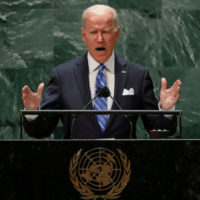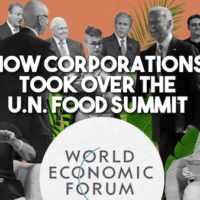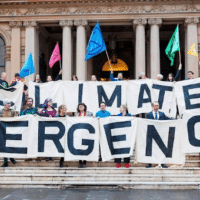-
Global Lenin
The picture presented in the volume is one of the Leninists’ Lenin (with partial exceptions), but he and his co-editors certainly did not aim at conveying a composite historical account that would include every possible voice from Russian Orthodox priests’ through neoliberal pundits’ and new right fascists’, to the Vatican’s or the Taliban’s conception of Lenin and his historical role.
-
Peasants and the Revolution
MARXIST theory develops with changing times, as capitalism itself develops, which is why it remains a living doctrine. On the question of the role of the peasantry in the revolutionary process that leads to the transcendence of capitalism, there have been significant developments in Marxist theory, which I propose to discuss here.
-
If the United Nations Charter was put to a vote today, would it pass?: The Thirty-Ninth Newsletter (2021)
Each year in September, the heads of governments come to the United Nations Headquarters in New York City to inaugurate a new session of the General Assembly.
-
The Global North isn’t ready for climate breakdown
European responses to extreme weather demonstrate post-industrial nations have much to learn from people in the Global South, writes Aranyo Aarjan.
-
Censorship is ok when transphobes do it
An interview in the Guardian (9/7/21) made waves—not because of something it said, but because of something it didn’t say.
-
Israel’s post-Gaza bombing assault on Black history and identities
To continue the marginalization of Black and, more recently, Muslim groups, you do not have to suddenly turn society upside down or challenge the dominant religious white or secular culture, or even, as in Nazi Germany, change citizenship and property ownership rules—in contrast to periodic historic assaults on certain white ethno-religious groups, who, by comparison, have sometimes enjoyed bourgeois, socioeconomic class power.
-
Out of the shadows: female Leninists and Russian socialism
In 1922, the great radical journalist Louise Bryant observed that Lenin drew great strength from the women close to him. Her observation contrasts sharply with the exploitative Lenin who has come to dominate historical studies and biographies.
-
The kaleidoscope of catastrophe – on the clarities and blind spots of Andreas Malm
The frustration with Malm’s lack of clarity and the praise for his ability to bring together Marxism and environmentalism are of a piece: they both attest to the enormous expectations generated by his work, and his willingness to place himself in a position of intellectual leadership.
-
Biden and Xi address UN, juggling differences amid calls for unity on climate and COVID-19
The leaders of the United States and China each pledged to the United Nations General Assembly on Tuesday that they would help press the fight against virulent pandemics and global warming–even as they offered vastly different visions of the world order.
-
What do we mean by metabolic rift?
rs21 member Greg Peakin explains the concept of metabolic rift, and why it is an important tool for climate organising today.
-
How big corporations and Bill Gates took over the UN food Summit
Large corporations and the Bill & Melinda Gates Foundation took over the United Nations Food Systems Summit, abandoning small farmers on behalf of Big Ag companies, endangering food sovereignty.
-
Time is running out for a new agricultural model for the global south
Agriculture—especially industrial agriculture requiring chemical inputs—is cause and victim of these changes. Cultivation patterns such as mono-cropping, with heavy reliance on groundwater and chemical inputs, have reduced the food sovereignty of poor countries and generated growing environmental problems.
-
Vectors or value Chains?
While the framework of “vectoralism” proposed by McKenzie Wark in Capital is Dead: Is This Something Worse? proves inadequate for understanding contemporary political economy, the concept of value chains developed by Intan Suwandi (Value Chains: The New Economic Imperialism) offers a promising alternative.
-
Engels and entropy
When it comes to rejecting the Second Law of Thermodynamics, only fools would rush in where Engels feared to tread.
-
‘From Production to Livelihood – Raymond Williams on Ecosocialism’: Part 3
In ‘Socialism and Ecology’ and ‘Ecology and the Labour Movement’, Raymond Williams is arguing the case for a political convergence. Socialism and the labour movement on the one hand, and the ecological or environmental movement on the other, should join forces and both be transformed in the process.
-
Call for a Fossil Fuel non-proliferation treaty
The scientific consensus is clear that human activities are primarily responsible for global climate change, and that the climate crisis now represents the greatest threat to human civilization and nature.
-
Progressive taxation for our times
As developing countries struggle to cope with the pandemic, they risk being set back further by restrictive fiscal policies. These were imposed by rich countries who no longer practice them if they ever did. Instead, the global South urgently needs bold policies to ensure adequate relief, recovery and reform.
-
The IPCC’s Red Alert
On Monday 9th August, the Intergovernmental Panel on Climate Change (IPCC) delivered a climate report warning of ‘code red for humanity’.
-
A Study of Monthly Review’s Marxist Political Science in the Twenty-First Century: A View from China
Since 2000, Monthly Review has focused on the current world situation, pursuing the all-round development of Marxist studies. In this way, it has helped create a significant new trend within the U.S. left, especially in Marxist political science.
-
Is public investment holding up global capitalism’s dynamism?
Capitalism is supposed to be all about economic growth, through the dynamism that is created by competition. This growth is meant to be driven by investment (or accumulation) which, in turn, is used to justify the shares of national income that are delivered to private profits, to the owners of capital.




















